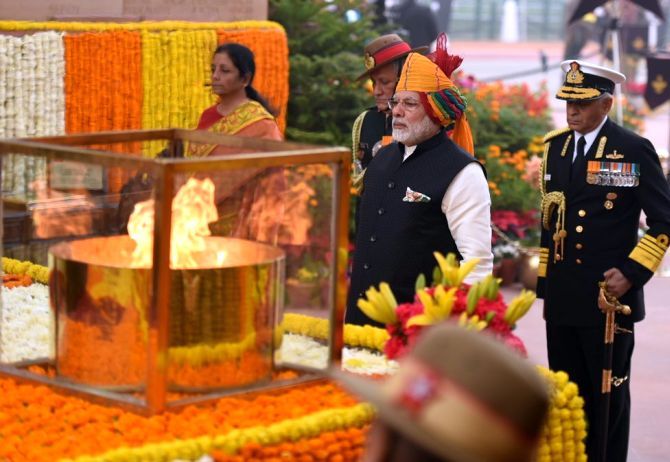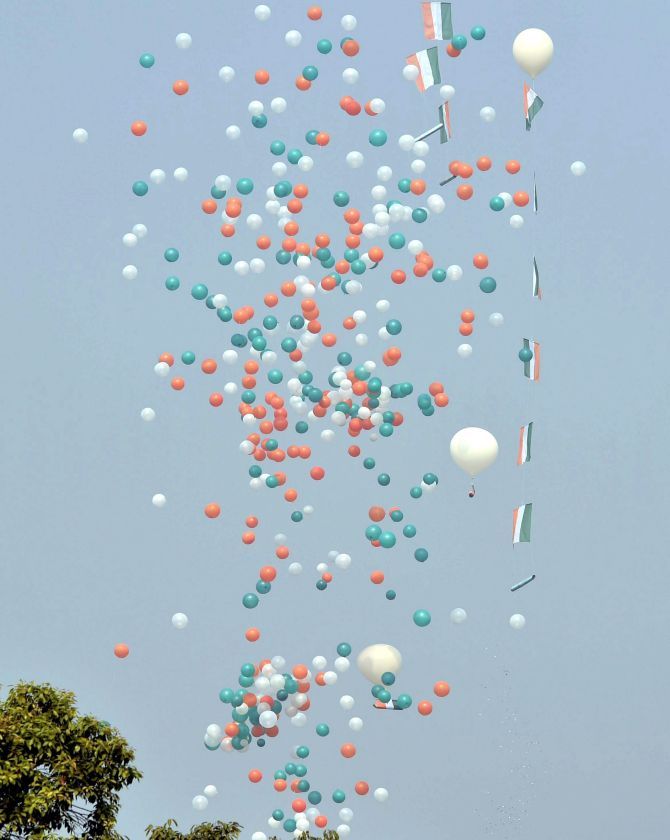India on Friday celebrated its 69th Republic Day with a grand display of the country’s military might and rich cultural diversity in the presence of leaders from all the ASEAN nations, in a historic first and unprecedented strategic outreach to the powerful bloc.
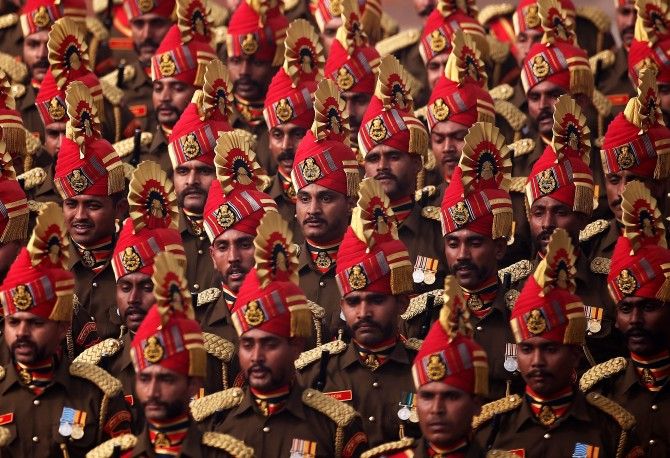
This is for the first time that leaders from 10 countries attended the annual celebrations as chief guests, and the overwhelming presence of the ASEAN leadership is seen as a reflection of India’s growing stature as a major power in the region where China has been expanding its footprint.
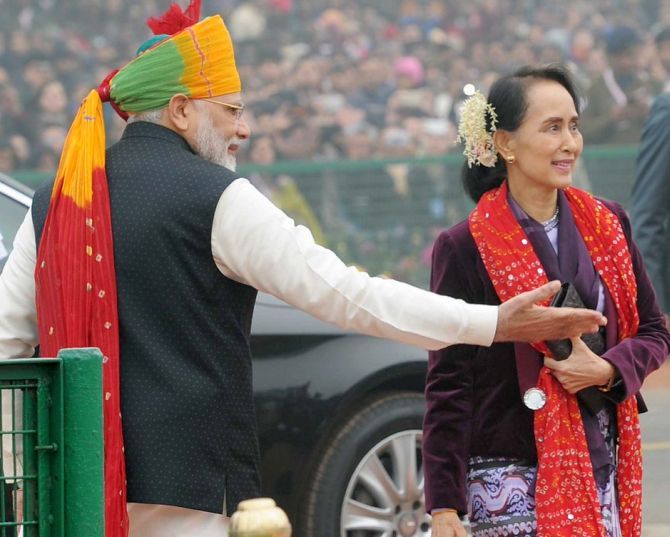
Photograph: PIBIndia/Twitter
Thousands of people on both sides of the Rajpath, India’s ceremonial boulevard facing the seat of power on the Raisina Hill, braved the winter chill and cheered loudly as the marching contingents and tableaux went past them.
Myanmar’s State Counsellor Aung San Suu Kyi, Vietnam Prime Minister Nguyen Xuan Phuc, Philippines President Rodrigo Duterte, Thai Prime Minister Gen Prayut Chan-o-cha, Singaporean Premier Lee Hsien Loong and Brunei’s Sultan Haji Hassanal Bolkiah were among the ASEAN leaders who attended the event.
Indonesian President Joko Widodo, Malaysian Prime Minister Najib Razak, Prime Minister of Laos Thongloun Sisoulith and Cambodian Premier Hun Sen also watched the grand parade.
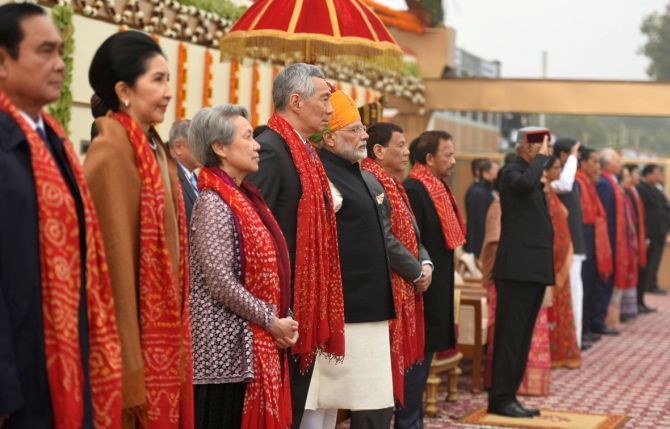
Photograph: PIBIndia/Twitter
In a series of tweets, Modi talked about India’s partnership with ASEAN and Thursday's India-ASEAN Commemorative Summit. “Their presence with us is an unprecedented gesture of goodwill from ASEAN nations.”
Before the beginning of the ceremony marking the date when India’s Constitution came into force way back in 1950, Prime Minister Narendra Modi, wearing a saffron, red and green safa (headgear), paid homage to the martyrs by laying a wreath at Amar Jawan Jyoti at the India Gate.
The parade was commanded by Lt General Asit Mistry, General Officer Commanding, Headquarters Delhi Area. The supreme commander of the Indian Armed Forces President Ram Nath Kovind took the salute at the parade.
India’s highest peacetime military decoration Ashok Chakra was posthumously given to IAF Garud commando Corporal Jyoti Prakash Nirala, who laid down his life after gunning down two terrorists in Jammu and Kashmir. The award was received by Corporal Nirala’s wife Sushmanand and his mother Malti Devi.
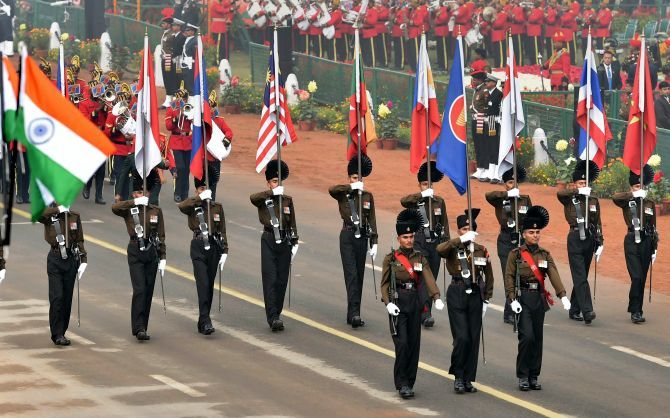
The celebrations were attended by most of the Union ministers, including Home Minister Rajnath Singh, Finance Minister Arun Jaitley, Health Minister J P Nadda, Information and Broadcasting Minister Smriti Irani, Law Minister Ravi Shankar Prasad and Environment Minister Harsh Vardhan.
Congress president Rahul Gandhi also attended the parade. He was seen sitting in the middle rows and chatting with senior Congress leaders and Leader of the Opposition in the Rajya Sabha Ghulam Nabi Azad.
India’s former Prime Minister Manmohan Singh and Delhi Chief Minister Arvind Kejriwal were also present on the occasion.
A march-past by the army personnel carrying the ASEAN flag also featured during the parade. The army personnel also carried the flags of the 10 ASEAN nations in the parade.
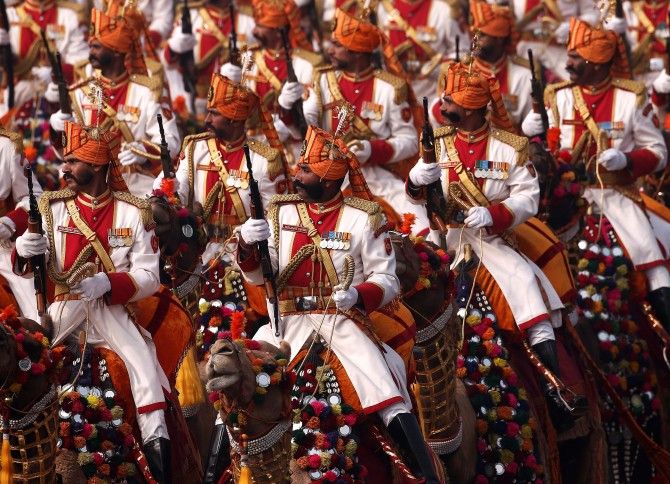
Twenty three tableaux, including those representing various states, ministries, the All India Radio (AIR) among others, rolled down the Rajpath.
Tableaux from 14 states and Union territories showcased the historical, art and cultural heritage of the country.
The highlight of the parade was the motorcycle contingent, ‘Seema Bhawani’, comprising women personnel of the Border Security Force that showcased their skills for the first time at the parade.
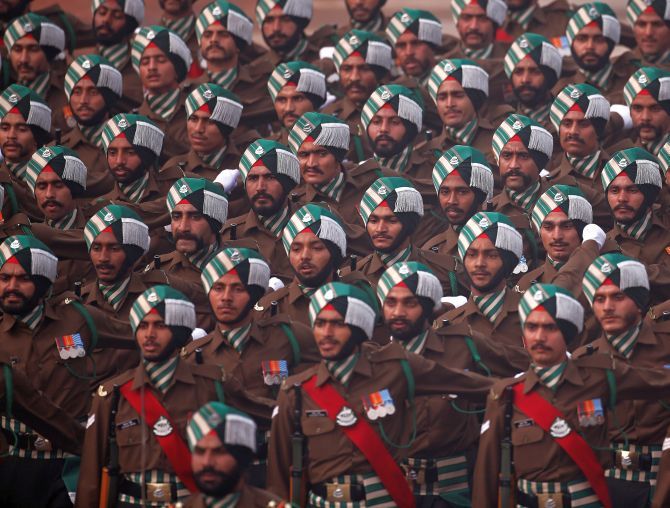
The Indian Army’s T-90 tank (Bhishma), Ballway Machine Pikate (II/IIK), Brahmos Missile System, Weapon Locating Radar (Swathi), Bridge Laying Tank T-72, Mobile Base Transceiver Station and Akash Weapon System were also showcased at the parade.
The marching contingent of the army included horse-mounted columns of the 61st Cavalry, the Punjab Regiment, Maratha Light Infantry, the Dogra Regiment, Ladakh Scouts and the Regiment of Artillery and 123 Infantry Battalion -- Territorial Army (Grenadiers).
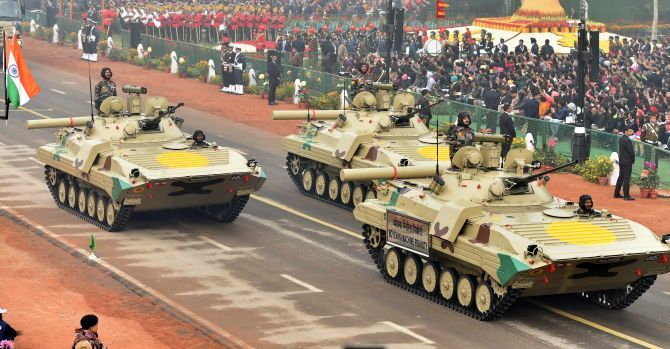
The marching contingent of the navy, comprising 144 young sailors, was led by Lieutenant Tushar Gautam, while the Indian Air Force contingent, comprising 144 men, was led by Squadron Leader Attal Singh Shekhon.
The paramilitary and other auxiliary civil forces, including the Border Security Force, also marched on Rajpath.
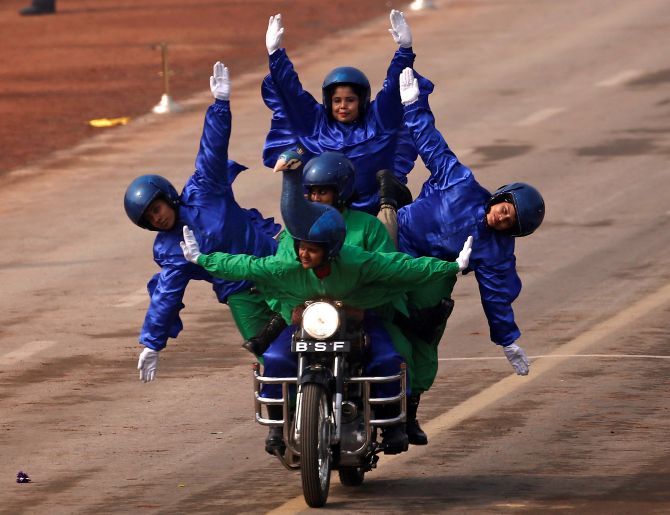
Camel contingents, Indian Coast Guard, Sashastra Seema Bal, Indo Tibetan Border Police, the Delhi Police, National Cadet Corps and National Service Scheme were also among the marching contingents at the parade.
The navy also showcased its Indigenous Aircraft Carrier Vikrant, which will be commissioned in 2020, while the Defence Development and Research Organisation exhibited the ‘Nirbhay’ missile and the Ashwini radar system.
The theme of the Indian Air Force tableau was themed ‘Indian Air Force Encouraging Indigenisation’ which displayed models of the Tejas Multi-role Fighter Aircraft, Rudra Helicopter, Arudhra Radar and the Akash missile system.
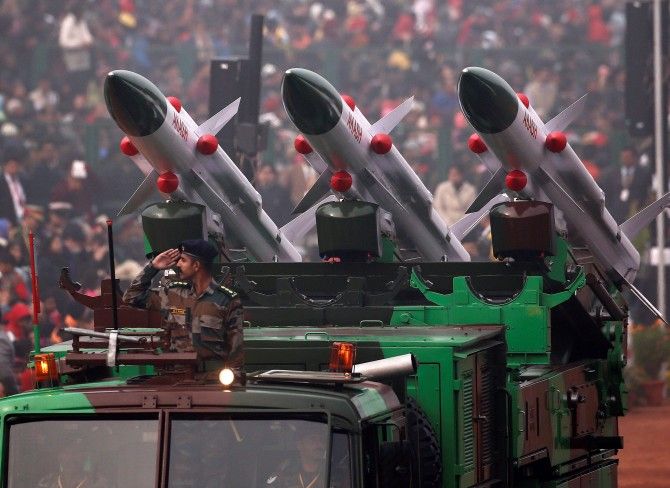
The All India Radio tableau featured Modi’s monthly address ‘Mann Ki Baat’ and was one of the many firsts this year.
Fifteen of the 18 children who won the National Bravery Award also participated in the parade. Three children, including two girls, have received the award posthumously.
Of the 18 children, seven are girls and 11 are boys.
In the children’s section, over 800 boys and girls drawn from three schools in Delhi along with a group of school children from Nagpur and Dimapur, performed colourful dances on different themes.
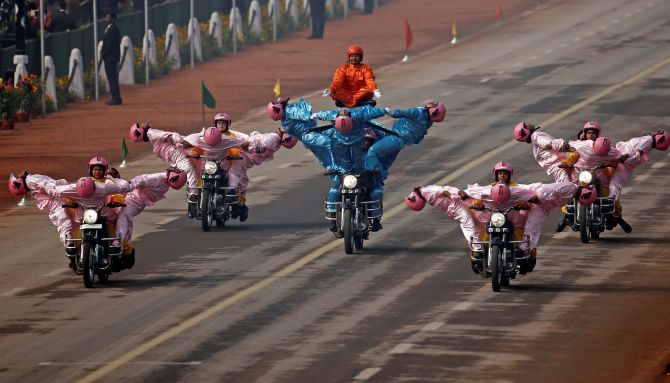
The grand finale of the parade was a spectacular flypast by MI-17 and RUDRA armed helicopters along with a number of IAF aircraft.
The flypast commenced with the ‘Rudra’ formation comprising three ALH Mk IV WSI helicopters in ‘Vic’ formation, followed by the ‘Hercules’ formation comprising three C-130J Super Hercules aircraft.
Trailing them was the ‘Netra’ which is an Airborne Early Warning and Control System Aircraft also known as ‘Eye in the Sky’.
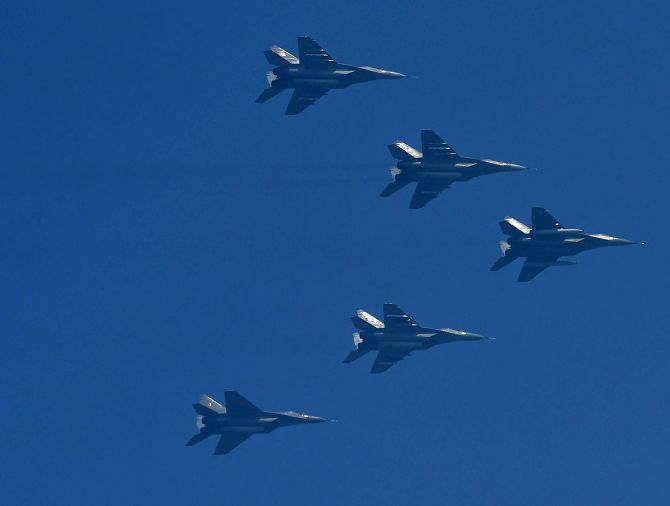
‘Netra’ was followed by the ‘Globe formation’ comprising one C-17 Globemaster flanked by two Su-30 MKIs among others.
Minutes before the parade began, the prime minister, Defence Minister Nirmala Sitharaman and chiefs of the Army, Navy and Air Force paid tributes at the ‘Amar Jawan Jyoti’, the war memorial at India Gate where an eternal flame burns in memory of those who laid down their lives defending the frontiers of the nation.
As per tradition, after unfurling the national flag, the national anthem was played followed by a 21 gun salute.
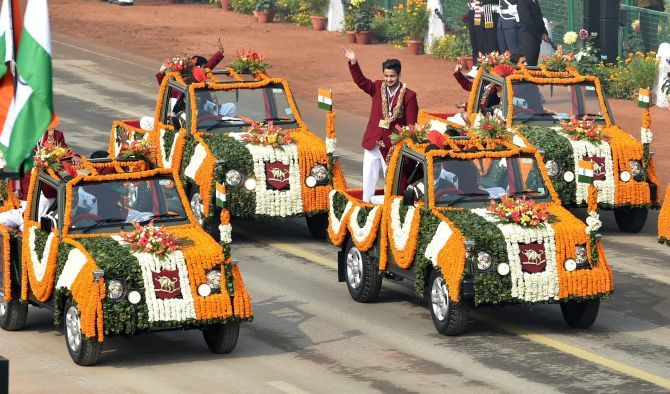
The ceremony ended also with the playing of the national anthem and the release of thousands of balloons.
Modi and president Kovind also waved to the crowd after the conclusion of the ceremony and were greeted with loud cheers.
Earlier, Modi greeted citizens on the occasion of the Republic Day, tweeting, “Greetings on #RepublicDay. Jai Hind.”
